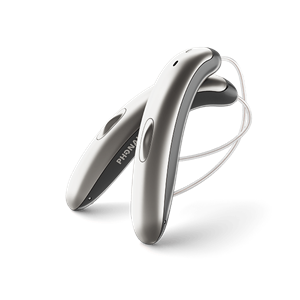What you should do if your hearing aids don't work | Connect Hearing

What you should do if your hearing aids don't work | Connect Hearing
10 min.
Publication Date: September 17, 2021
One of the biggest challenges hearing professionals face when helping patients with hearing loss is to help them choose the most appropriate hearing aids for their needs. Unfortunately, several things can go wrong with hearing devices, leading to possible negative user experiences, causing people to give up on their hearing aids altogether. Understandably, when you have a hearing aid that is not working, it can be extremely frustrating.
A hearing aid that isn’t working properly and ends up at the bottom of drawers does not serve anyone and can quickly become a source of significant disappointment. In fact, when people run into hearing aid issues, they often feel helpless as they ponder what could go wrong with the tiny device. If they cannot troubleshoot the problem, they often stay away from hearing aid technology altogether.
But troubleshooting new hearing aids may not be as difficult as you may think. While you can encounter problems with both behind-the-ear or in-the-canal hearing aids, this article will help you address some common issues that you can easily fix without having to see your audiologist. So, before calling it quits, discover the most common hearing aid problems and what you can do to correct them.
Is your hearing aid not working? Check the programming
As you know, every human being is unique; your hearing - and hearing loss - are no different. This uniqueness explains why your audiologist has to tailor your aids' programming to meet your specific needs. Considering the complexity of hearing aids, your hearing care professional may use the wrong configuration, resulting in a less than ideal hearing aid performance.
If the trouble you are having is with an older hearing aid, your audiologist may need to modify the settings to adjust it to your changing hearing. Similar to our eyesight, our hearing can change over time. If your vision declines, you will need a new prescription for your glasses. Apply the same concept to your hearing and get a hearing test regularly, ideally every year. If you have not been to your hearing aid provider for several years, chances are your hearing loss worsened, and your hearing aid is not working as well as before to amplify the sounds enough to make speech audible around you.
While this may sound disappointing, reprogramming the hearing aids to meet your current level of hearing loss is not too complicated, and your audiologist can help you with that.
If you have not had a hearing test for over five years, you may want to look at getting a new device. The best thing you can do to ensure your hearing stays well is to make regular visits to your hearing care professional and make small adjustments to your changing needs.
Is your hearing aid fitted correctly?
When you get a new hearing aid, your hearing professional must verify that your hearing aids are correctly fitted. The device must be tested to make sure the sound is audible, not too loud, and the volume is set for soft, average, and loud sounds. People often seek help from their hearing professionals thinking they need new devices, and then find that a simple setting adjustment is enough to address the reason why their hearing aid may not be working properly.
If the fitting is the issue, you have two options. One is to give it some time and see if you can get used to your aids or request a new mold. The bottom line is, incorrect programming or fitting should not discourage you from using your hearing device, as you can resolve both issues fairly easily.
Are your hearing aids well taken care of?
Due to the small size of hearing aids, debris and earwax can easily get trapped in them, preventing them from working properly. While earwax or (cerumen) is perfectly normal, large amounts of it can clog the device. If you are someone whose ears produce an excessive amount of wax, you will need to be vigilant in cleaning your hearing aids daily.
Be sure to keep your hearing devices clean, change wax guards regularly, and avoid wearing your aids when styling your hair with hairspray. If you have trouble cleaning your hearing aids because of vision or dexterity issues, ask your hearing aid professional if they can help you or at least teach your family member to do it for you.
Is there a change in the shape of your ear canal?
Many people are unaware that the shape of the ear canal changes as we age. In addition, weight changes and specific plastic surgeries can also alter the ear canal shape. If a slit-leak occurs, air can get around the device, causing your hearing aid not to be working as expected, reducing its ability to amplify sounds and create feedback.
If you have excessive earwax lodged in the ear canal, that can also contribute to feedback. Naturally, you can remedy this issue by removing the excess ear wax or remaking the hearing aid after taking a new ear impression.
Do you need more than a hearing aid?
People with Auditory Processing Disorder (APD) deal with a more complex hearing problem than hearing loss. ADP affects the auditory system at the brain's level by disrupting how your brain understands what you hear. Even though those with the disorder have trouble with hearing-related tasks, it is not considered a type of hearing loss.
Hearing aids alone are not sufficient to correct the underlying problem of ADP. In addition to hearing devices, aural rehabilitation and other devices may be necessary for those with severe difficulties hearing in environments with a lot of background noise.
Is moisture trapped in your device?
If you forget to remove your hearing aid before jumping in the pool or shower, moisture can easily get into your device. Unlike earwax, moisture can negatively affect the entire hearing aid. As a result, various glitches can occur, such as causing the sound to go in and out or the entire device to stop working. It's best to place your aids into a drying jar at night and clean them every day.
Do you use your hearing aids often enough?
If you are new to hearing aids, know that it takes time to get fully accustomed to your device. If you only wear your aids occasionally or just a few hours a day, it will take much longer to reap the full benefits. Sporadic use can give you the false impression that your hearing is not working. Therefore, we recommend using your device consistently, at least eight hours a day.
Is your device giving out a whistling sound?
Although most modern hearing aids have automatic feedback cancellation, you might still get a whistling sound sometimes. Here is what you can do to avoid this:
First, do not cover your hearing aids with a hat or scarf. Second, when you lay down, you should avoid leaning your ear against a pillow. Both of these may trap sound and cause it to re-enter the microphone. Third, be sure to place the earmold inside the ear. If the tip is not in the proper position, you will be more likely to get feedback. Fourth, set the volume correctly. If you turn the sound up too high, feedback can occur. Finally, ask your hearing aid professional to check your ear and remove any trapped ear wax.
Does your device not turn on?
If replacing the battery does not solve this problem, try the following tips:
- Make sure the battery is inserted the right way.
- Some devices have an on/off button. Make sure your device is on.
- Remove any debris.
- Check if the tubing or wiring is intact. If you notice any tears or cracks, be sure to get those parts replaced.
Is the sound quality too weak?
For first-time users, audiologists often set the volume below prescription strength to give you time to get used to the device. It is not uncommon that the sound seems weaker or even dull after a few weeks of use. According to experts, this is a sign that your brain is getting accustomed to the sounds and that your device needs a volume boost. Be patient; it may take several appointments with your hearing specialist to get the sound right.
Older devices experiencing weaker sounds may be due to old batteries or clogged wax filters.
Hearing aids can be life-changing in that they can drastically enhance the quality of life of people suffering from hearing loss and the people around them. Nonetheless, when your hearing aid is not working as intended, it can be discouraging. Schedule regular visits with your audiologist, and don't be shy to discuss any problems you encounter. Keep your hearing device in good condition and get regular hearing tests to monitor your hearing.
Author
Connect Hearing Canada



